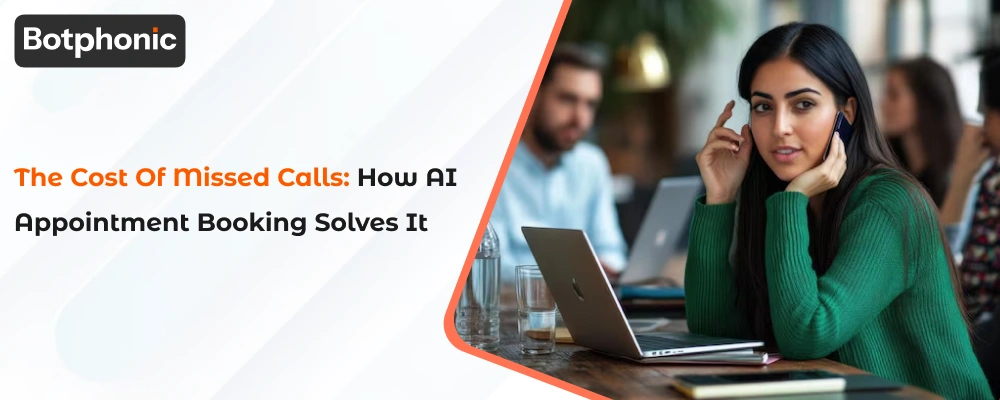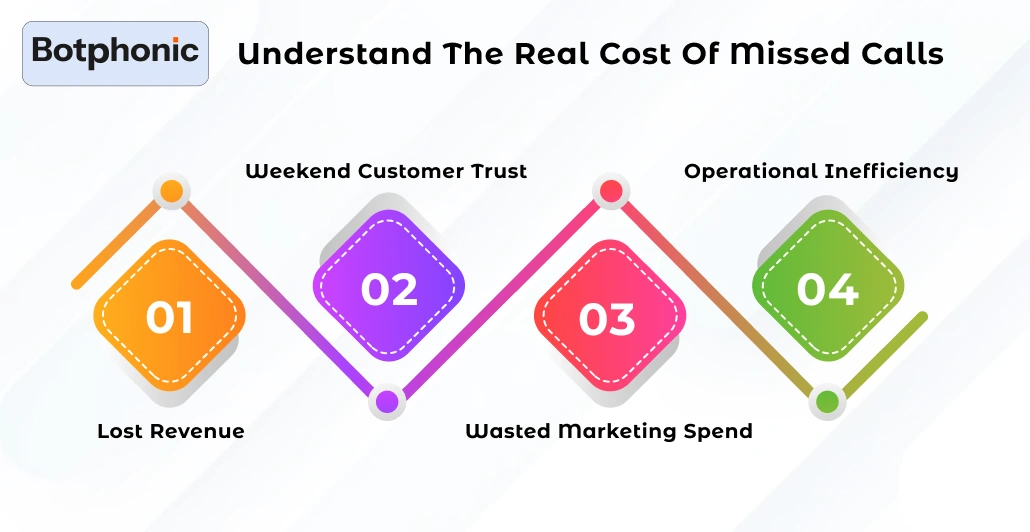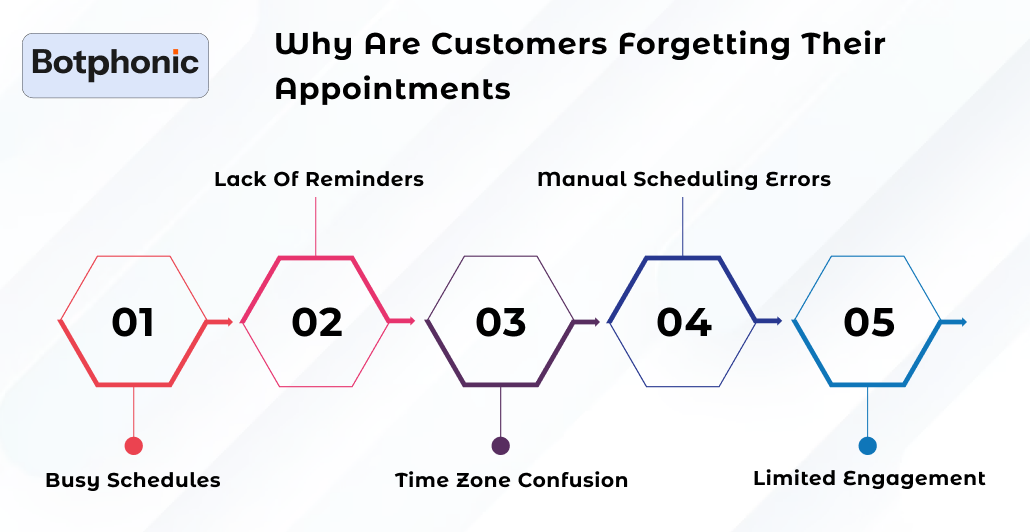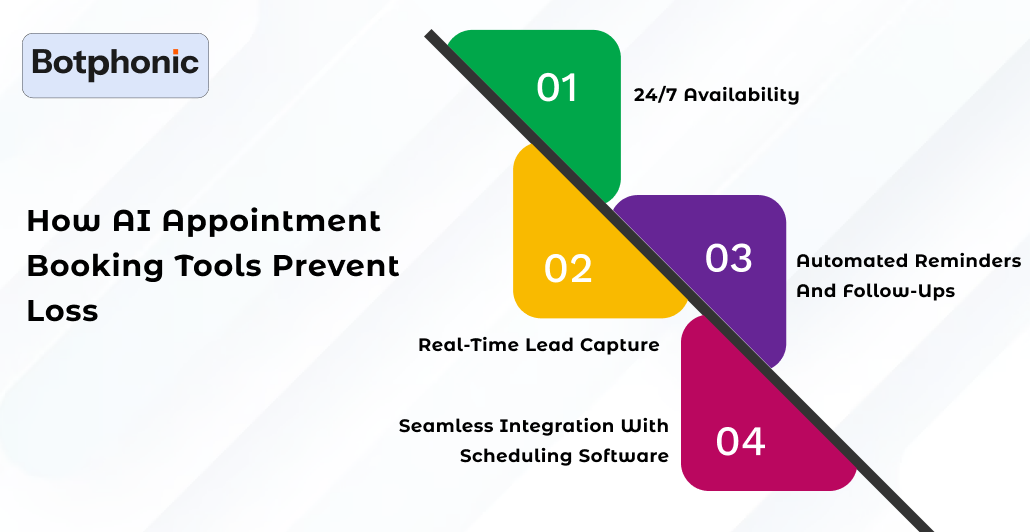
Summarize Content With:
Quick Summary
Just imagine, it’s 6:50 PM, just a few minutes to close your shop for the day. But the phone is ringing not just once, but twice and thrice. When there’s no response, the caller hangs up, and they move on to the next available business. What you are going to see is not just a missed call but a missed call appointment loss. There’s a customer who could have booked your service but didn’t.
To help with these, we have AI appointment booking, which helps businesses ensure all the calls are responded to and no revenue is lost. With the increasing demand of customers’ expectations, it has really become important to serve clients quickly and resolve their queries as soon as possible.
Introduction
Missed calls are something that doesn’t cost anything to the caller but to the person who missed the call. Even for small and medium-sized businesses, calls are equal to revenue. It even results in wasted marketing spend and damaged customer trust. In industries where appointments are the bottom line, such as healthcare, automotive services, and small businesses. A single missed call is equal to a missed lead or a missed sale.
The real problem is often referred to as missed calls appointment loss, which iṣḍs a more common issue than many realize.
But as AI is introduced in the industry, it is integrating with advanced voice AI appointment booking software, conversational AI tools, and automated appointment schedulers. These have enabled businesses to capture every lead coming through, allowing them to book more appointments in real time and reducing the significant impact of missed calls.
Understand The Real Cost of Missed Calls

Missed calls might be a mere inconvenience for people, but for businesses, they impact revenue and the firm’s growth. Every time a call goes unresponded to, there’s a high chance of appointment loss. Even customers these days are expecting quick and seamless scheduling. If the business is not available for them readily, they will just take their business to somewhere else.
Let’s see what a missed call appointment loss really looks like:
- Lost Revenue: In industries such as healthcare and automotive services, a single missed call equals hundreds of dollars.
- Weekend Customer Trust: When clients don’t get the response they were expecting, they are less likely to return to your business.
- Wasted Marketing Spend: Businesses are already spending to generate leads through advertising and marketing via Google Ads or others. Yet, if those leads are turned into missed calls, it’s not just leads you are missing but also wasting budget.
- Operational Inefficiency: Staff had to spend half of their time playing phone tag, leaving voicemails, and manually re-entering data into their scheduling software.
A Concrete Example: What Does a Missed Call Really Cost?
Let’s walk through a hypothetical, data-driven scenario so you—and your readers—can see how missed calls add up into serious losses.
| Metric | Assumption | Explanation / Source |
| Calls per day | 25 inbound calls | A modest volume for a small to mid business |
| Workdays per year | 250 | Excludes weekends and holidays |
| Total calls per year | 25 × 250 = 6,250 calls | — |
| Missed-call rate | 10% | Businesses often miss 10 %–22 % of incoming calls |
| Missed calls per year | 6,250 × 10% = 625 missed calls | — |
| Conversion from call → paying customer | 40% of answered calls lead to booking | This depends on business; you’ll plug in your own “close rate” |
| Average revenue per appointment | $150 | (Or local equivalent — e.g. €150 or higher for some industries) |
| Effective lost bookings per missed call | 0.4 × 1 = 0.4 bookings missed per missed call | Because only a fraction of calls convert |
| Lost revenue per missed call | 0.4 × $150 = $60 | — |
| Annual loss from missed calls | 625 × $60 = $37,500 | — |
In this scenario, missing just 10 % of calls leads to $37,500 in lost revenue per year.
Hidden and Secondary Costs You Should Factor In
Revenue from direct bookings isn’t the only cost you are paying, but missed calls have their own ripple effects:
- Wasted Marketing Spend: While businesses had already paid to drive leads, if they are losing the calls, it just means that the investments have yielded nothing.
- Lost Lifetime Value(LTV): A one-time appointment isn’t the total value of the invested lead. Repeat business, upsells, referrals, all this gets lost when the first contact fails or isn’t effectively done.
- Reputation Damage or Brand Trust Erosion: Prospects tend to ask for instant responsiveness, and if they don’t get it, they are less likely to come back to you. They may even badmouth the business online.
- Staff Time and Inefficiency: Actively chasing callbacks, playing phone tag, and logging missed calls means they are just taking away all the productivity.
- Opportunity Cost: Money invested and lost here could have easily been reinvested in expansion, tools, staff welfare, etc.
Why Are Customers Forgetting Their Appointments

There are chances that even if appointments are booked successfully, businesses still face losses from no-shows or forgotten appointments. Understanding this really important aspect and why it happens is crucial for resolving this issue and for reducing missed revenue.
Common Reasons Why Customers Are Forgetting Their Appointments
- Busy Schedules: Life is meant to be hectic for a few people. Customers may double-book themselves without knowing or get caught up at work, and most importantly, simply forget about the appointment.
- Lack of Reminders: Traditional reminder methods, such as phone calls or emails, might fail. Mails might get lost in inboxes or just go unheard.
- Time Zone Confusion: It’s especially relevant for online consultations or services that have targeted multiple regions. The client might just misinterpret the time.
- Manual Scheduling Errors: Mistakes made during booking, or due to staff oversight or miscommunication, can occur and lead to the appointment being forgotten or missed.
- Limited Engagement: Customers are more likely to remember the appointment and show up on time only if they have felt personally engaged or got reminded in real-time.
How AI Appointment Booking Helps
Modern appointment scheduling AI tools and AI appointment booking bots reduce these risks:
- Automated Reminders: SMS, email, or voice reminders are effectively delivered on time.
- 24/7 Accessibility: Allows the client to reschedule instantly if there are changes in plan.
- CRM Integration: Ensures every appointment is recorded and tracked across the client portal and scheduling software.
- Conversational AI: Assists with a human-like interaction that confirms appointments and answers questions, improving clients’ engagement overall.
Addressing these causes, AI solutions help businesses minimize missed appointment rates, fend off lost revenue, and maintain a stronger connection with clients.
Reducing No-Shows: Before AI vs After AI
| Metric | Before AI Appointment Booking | After AI Appointment Booking |
| Missed Appointments / Month | 40 (16% of total bookings) | 12 (5% of total bookings) |
| Revenue Lost / Month | $6,000 | $1,800 |
| Reminder Method | Manual phone calls & emails | Automated SMS, email, and voice AI reminders |
| Rescheduling Efficiency | Low – clients call back during business hours | High – clients reschedule instantly via AI or client portal |
| Customer Engagement | Minimal – no follow-up unless staff initiates | High–conversational AI confirms appointments and answers queries in real time |
Learn more: What Is AI Appointment Booking? A Complete Guide
How AI Appointment Booking Tools Prevent Loss

The biggest challenge with missed calls and appointment loss is that it’s not physically present to get easily recognized. With its invisibility, businesses don’t even realize how opportunities are slipping out of their hands. An AI appointment booking tool solves all these problems just by capturing all the leads on time.
1. 24/7 Availability
Customers won’t have to wait for business hours to get answers to their queries. With AI voice agents for appointment booking and appointment booking AI bots for small businesses, clients can just book, cancel, or reschedule their appointments anytime they want.
2. Real-Time Lead Capture
AI actively acts as a lead generation and qualification tool. Instantly engaging callers and answering common questions, then proceeding with directing qualified leads straight to the sales process or CRM system.
3. Automated Reminders and Follow-Ups
Forgetfulness is one of the other forms of attention loss. Conversational AI for appointment booking allows automation reminders via SMS, email, or voice calls. All these features drastically help in reducing missed appointments, and with predictive analysis, it even identifies high-risk no-shows and re-engages them proactively.
4. Seamless Integration with Scheduling Software
AI doesn’t just schedule appointments but integrates them with your pre-existing appointment scheduler, client portal, or scheduling software. With this active approach, it means there are no longer double-bookings, fewer errors, and a much smoother experience for both staff and customers.
Why Your Bottom Line Depends on AI Scheduling
The bottom line of any industry is directly tied to how well appointment management is done. Every missed call or forgotten booking translates to lost revenue. AI scheduling effectively ensures that every lead is captured, qualified, and calendared full with prospects’ consultations.
Leveraging predictive analytics, AI can easily forecast busy periods, send automated reminders, and even free up staff from manual scheduling tasks. And it also integrates with CRM systems, making the whole sales process seamless.
Contact Botphonic today and see how the AI appointment bookings tool transforms your business.
Try the demo now!!!Conclusion
Missed calls are no longer just a small setback; they have become an expensive component that impacts the whole revenue, customer trust, and overall growth. With AI-powered appointment booking and AI call assistant, it has become easier to capture every lead and keep schedules running effortlessly.
These tools are not just improving the convenience, but they are effectively helping in increasing conversions, minimizing cancellations, and even strengthening long-term profitability. It also protects profits by turning those missed calls into confirmed bookings, resulting in more revenue and less wasted resources.

